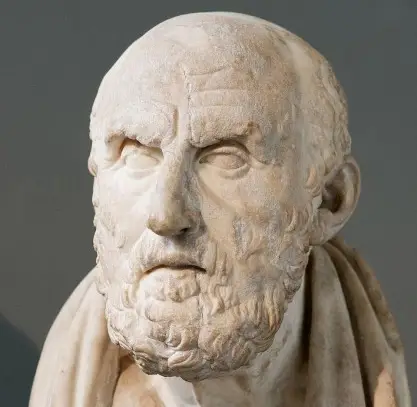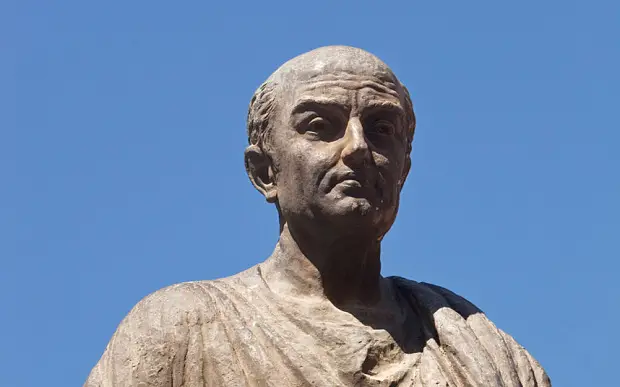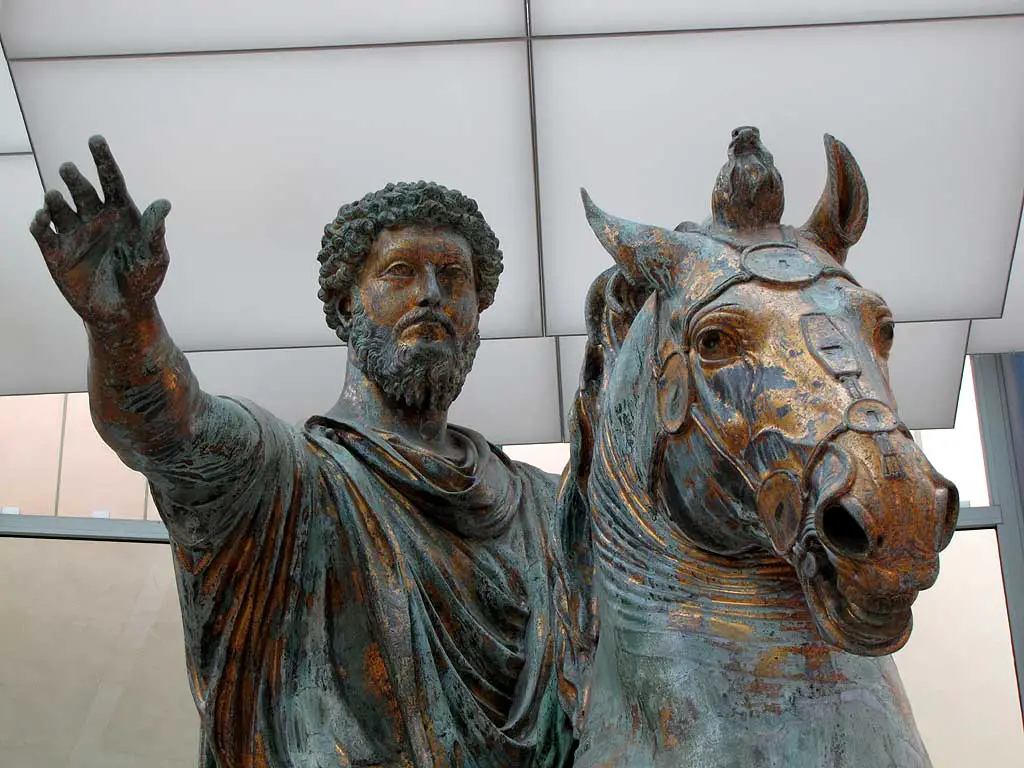Stoicism Now
How an ancient philosophy can open the door to your happiness.
By Tim Philbin, College of the Holy Cross
It sometimes seems like everyone is pretending that college life is all sunshine and rainbows.
These four years are touted as the best time of your life, a time to decide who you want to be and what you want to do . College is certainly all of these things, but it is also more.
College is awesome, but it does not shield students (nor should it) from hardship. College students are routinely inundated with mountains of schoolwork, warily navigating difficult relationships or simply struggling through class while nursing a hangover. We have all had friends who have been unable to deal with the pressure of these difficulties, resulting in consequences ranging from mildly unpleasant to dire in severity.
We also have all had friends, however, who have faced these same troubles and have remained unfazed, somehow able to take on seemingly endless waves of challenges with calm and serenity.
Stoicism is an ancient Greek and Roman philosophy that can give you the tools to deal with your problems, whatever they may be, in the latter manner.
Philosophy is often seen as nothing more than airheaded, hopelessly academic pretension with little or no relevance to everyday life.
The stoics however, did not view it this way. They saw philosophy as a tool for ordinary people to find meaning and happiness in their everyday lives. Furthermore, the stoics demonstrated that happiness is a matter of outlook, not circumstance; in other words, to be happy, one need only the right perspective, irrespective of wealth, reputation or anything else outside of one’s mind.
To the stoic, the mark of a good philosopher was not eloquence or good ideas, but rather a life well lived. So, in the spirit of stoicism, rather than launch into a boring exposition of stoic philosophy, let’s take a look at the lives of three great stoic philosophers: Seneca, Epictetus and Marcus Aurelius.
Epictetus was born in Greece in 55 AD. He was born into slavery; in fact, his name is derived from the Greek word epiktetos, meaning “acquired.” While he was still a young man, his master moved to Rome, and so Epictetus moved with him.
 With the permission of his master, he became educated in philosophy, and eventually acquired his freedom (slaves could buy their freedom or receive it as a gift from their master in the Ancient World), and so he began to teach philosophy. Not much is known about his life, other than that he lived quite simply with very few possessions.
With the permission of his master, he became educated in philosophy, and eventually acquired his freedom (slaves could buy their freedom or receive it as a gift from their master in the Ancient World), and so he began to teach philosophy. Not much is known about his life, other than that he lived quite simply with very few possessions.
The central point of Epictetus’ philosophy that is highly relevant to modern daily life is that we should accept what we cannot control (being born into slavery, for instance). Epictetus states this himself better than I ever could in the very first line of his most famous work, the “Enchiridion:” “Some things are in our control and others not. Things in our control are opinion, pursuit, desire, aversion, and, in a word, whatever are our own actions. Things not in our control are body, property, reputation, command, and, in one word, whatever are not our own actions.”
Ask yourself how often you worry about your physical appearance, or what other people think of you or any number of other factors that are beyond your control. Epictetus wisely reminds us that worrying about such matters is not worth the trouble. After all, what does worrying accomplish anyway? Focus on what you can control: your desires, opinions etc. and let the rest worry about itself.
By the way, in case you’re thinking that Epictetus’ philosophy has no relevance to modern life, I recommend a book entitled “Courage Under Fire: Testing Epictetus’s Doctrines in the Laboratory of Human Behavior” by James Stockdale.
Stockdale was a fighter pilot in the Vietnam War. He was shot down over enemy territory and was held as a POW for seven and a half years, during which he was tortured repeatedly and held in solitary confinement for four years. He credits the teachings of Epictetus for allowing him to endure his ordeal. Epictetus may have been confined to the Ancient world, but his teachings have much broader implications.
Marcus Aurelius was Emperor of Rome from 161-180 AD. He spent the majority of his reign on the outskirts of his Empire fighting invincible hordes of Germanic tribes attempting to encroach on his borders. Each night, he would retire into his tent after a long day of campaigning and write philosophical notes to himself.
These notes have been compiled and published under the simple but accurate title, “Meditations.” Aurelius’ insights are concise but profound. He often expresses in a single sentence what a lesser philosopher would in an entire novel.
To give an example, he writes, “The universe is change; our life is what our thoughts make it.”
Another piece of wisdom: “We ought to do good to others as simply as a horse runs, or a bee makes honey, or a vine bears grapes season after season without thinking of the grapes it has borne.”
Much of Aurelius’ writing is centered around one’s ability to be happy by thinking properly. Aurelius believed that you could make a choice to be happy by accepting that, while the universe can often seem chaotic and ever changing, you can exert power over your mind. That is where we find stability and, ultimately, joy. As he said himself, “Very little is needed to make a happy life; it is all within yourself, in your way of thinking.” Don’t worry about what the future holds; accept with grace the opportunities of the present. Learn to do that, and one can be truly happy, even when fighting invincible hordes of barbarians.
Lucius Annaeus Seneca was born in 4 BC in Cordoba, Spain, but he was raised and educated in Rome. During the life of Seneca, Rome was at the height of its powers; it was the capital of the world. The Roman Empire stretched from Spain in the west to Persia in the east, and from Britain in the north to Egypt in the south (click here for a map of the Roman Empire).

Rome itself was a sprawling metropolis by ancient standards; during the life of Seneca, it contained almost 1.5 million inhabitants, more than any other city the world had ever known. But despite all this success, Seneca’s Rome was also undergoing a period of great strife and suffering, the reason for which was one man: Nero.
If you are already familiar with the life and times of Nero, congratulations on your knowledge of Roman history. If you are not, then first imagine Donald Trump on steroids, then imagine that someone had the bright idea to make him dictator of the world. That’s a rough approximation of Nero. This was a man who murdered his own mother, burned down half of Rome to make space for his new palace, and eventually had to be assassinated by his own bodyguards for the good of Rome. Needless to say, Nero was completely insane, and Seneca was saddled with the undesirable task of being his tutor.
As you might imagine, being Nero’s tutor can be hazardous to your health. One day in 62 AD, essentially on a whim, Nero accused his tutor of plotting against him and condemned him to death. As Seneca was being dragged away to a bathroom where he was to commit suicide, his family was understandably upset and crying hysterically. In response, Seneca simply smiled and famously quipped, “What need is there to weep over parts of life? The whole of it calls for tears.” On the face of it, Seneca’s quote might seem utterly depressing. After all, he seems to be admitting that life is fundamentally sad. But this is precisely the point of stoicism; it is not afraid to admit that life can be heartbreakingly sad, and yet that sadness doesn’t hold power over you unless you let it.
Seneca can show courage, serenity and even joy in the face of unimaginable suffering because he is aware of this fact. Now obviously, it’s very unlikely that anyone reading this article will be forced to commit suicide in front of their family any time soon, but Seneca stands as an important, stoic reminder that one can find happiness regardless of circumstance if one looks in the right way. So the next time you feel like you can’t take it anymore, remember Seneca’s wisdom. You are stronger than you think.









